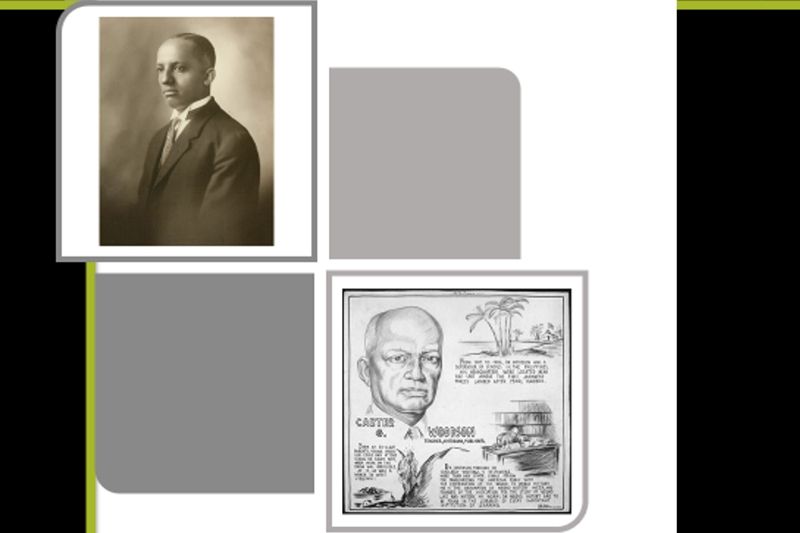Carter Godwin Woodson (December 19, 1875 -- April 3, 1950) was an African-American historian, author, journalist and the founder of the Association for the Study of African American Life and History. Woodson was one of the first scholars to study African American history. A founder of Journal of Negro History (now titled The Journal of r. Woodson has been cited as the father of black history.
| Born | December 19, 1875 New Canton, Virginia |
|---|---|
| Died | April 3, 1950 (aged 74) Washington, DC |
| Education | B.Litt, Berea College (1903) A.B.; M.A., University of Chicago (1908) PhD, Harvard University (1912) |
| Occupation | Historian |
| Known for | Founded the Association for the Study of Negro Life and History (now called Association for the Study of African American Life and History). Established Negro History Week. |
Self-made photo of a roadside marker about Carter G. Woodson in Huntington, West Virginia, near the intersection of Carter G. Woodson Ave. & Hal Greer Blvd. Image taken on June 4, 2006. The marker reads:
Carter Godwin Woodson
Historian, author, educator. Founder of the Assoc. for the Study of Negro Life & History, 1915. Began Journal of Negro History, 1916. In 1926 began Negro History Week, later Black History Month. A graduate and later principal, Douglass H.S., Huntington. Dean at West Virginia State College. Second African American to earn a Harvard Ph.D., 1912. Born, Dec. 19, 1875; Woodson died, April 3, 1950.
Legacy and honors
That schools have set aside a time each year to focus on African-American history is Woodson's most visible legacy. His determination to further the recognition of the Negro in American and world history, however, inspired countless other scholars. Woodson remained focused on his work throughout his life. Many see him as a man of vision and understanding. Although Woodson was among the ranks of the educated few, he did not feel particularly sentimental about elite educational institutions. The Association and journal that he started in 1915 continue, and both have earned intellectual respect.
Convinced that the role of his own people in American history and in the history of other cultures was being ignored or misrepresented among scholars, Woodson realized the need for research into the neglected past of African Americans. Along with Alexander L. Jackson, Woodson in 1915 published The Education of the Negro Prior to 1861. His other books followed: A Century of Negro Migration continues to be published by the Association for the Study of African American Life and History (ASALH).
Also in 1915 Woodson began the Association for the Study of Negro Life and History (now the Association for the Study of African American Life and History), which ran conferences, published The Journal of Negro History, and "particularly targeted those responsible for the education of black children".
His final professional appointment in West Virginia was as the Dean of the West Virginia Collegiate Institute, now West Virginia State University, from 1920 to 1922.
He studied many aspects of African-American history. For instance, in 1924, he published the first survey of free black slaveowners in the United States in 1930. He once wrote:
If you can control a man’s thinking, you don’t have to worry about his actions. If you can determine what a man thinks you do not have to worry about what he will do. If you can make a man believe that he is inferior, you don’t have to compel him to seek an inferior status, he will do so without being told and if you can make a man believe that he is justly an outcast, you don’t have to order him to the back door, he will go to the back door on his own and if there is no back door, the very nature of the man will demand that you build one.
The Journal of African American History
Formerly The Journal of Negro History Founded by Carter G. Woodson, January 1, 1916 A Publication of the Association for the Study of African American Life and History
Volume 1: 1916 | Volume 2: 1917 | Volume 3: 1918 | Volume 4: 1919 | Volume 5: 1920 | Volume 6: 1921 | Volume 7: 1922 | Volume 8: 1923
Woodson, Carter G. 1915. The Education of the Negro prior to 1861. New York: Putnam.
Woodson, Carter G. 1998. The Mis-Education of the Negro. (1933). Trenton, NJ: Africa World Press.
Woodson, Carter G. 1971. The African Background Outlined. (1936). New York: Negro Universities Press.
Woodson's other far-reaching activities included the founding in 1920 of the Associated Publishers, the oldest African-American publishing company in the United States. This enabled publication of books concerning blacks that might not have been supported in the rest of the market. He founded Negro History Week in 1926 (now known as Black History Month). He created the Negro History Bulletin, developed for teachers in elementary and high school grades, and published continuously since 1937. Woodson also influenced the Association's direction and subsidizing of research in African-American history. He wrote numerous articles, monographs and books on Blacks. The Negro in Our History reached its eleventh edition in 1966, when it had sold more than 90,000 copies.
Dorothy Porter Wesley stated that "Woodson would wrap up his publications, take them to the post office and have dinner at the YMCA." He would teasingly decline her dinner invitations saying, "No, you are trying to marry me off. I am married to my work". Woodson's most cherished ambition, a six-volume Encyclopedia Africana, lay incomplete at his death on April 3, 1950 at the age of 74. He is buried at Lincoln Memorial Cemetery in Suitland, Maryland.
In 1926, Woodson received the National Association for the Advancement of Colored People Spingarn Medal. In 1992, the Library of Congress held an exhibition entitled "Moving Back Barriers: The Legacy of Carter G. Woodson". Woodson had donated his collection of 5,000 items from the 18th, 19th, and 20th centuries to the Library. His Washington, D.C. home has been preserved and designated the Carter G. Woodson Home National Historic Site. In 2002, scholar Molefi Kete Asante named Carter G. Woodson on his list of 100 Greatest African Americans.














